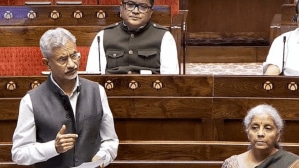Advocates boycott Karnataka HC proceedings in protest over SC Collegium transferring 4 judges
Most cases at the Karnataka High Court were adjourned on Wednesday as advocates boycotted proceedings in protest over the Supreme Court Collegium directing the transfer of four judges to other states.
 In this case, a Bengaluru firm, M Moser Design Associates, had approached the high court about the alleged targeting of some women employees using the Proton Mail service. (Express File Photo)
In this case, a Bengaluru firm, M Moser Design Associates, had approached the high court about the alleged targeting of some women employees using the Proton Mail service. (Express File Photo)Advocates boycotted the proceedings of the Karnataka High Court on Wednesday, stepping up their protest over the Supreme Court Collegium directing the transfer of four judges to other states.
“This has become a very emotional issue for our lawyers….we only request that cases should not be damaged. We have no personal interest, we are doing this for the institution…,” Advocates Association of Bengaluru (AAB) president Vivek Subba Reddy told Chief Justice N V Anjaria on Wednesday morning as advocates left the court hall.
Chief Justice Anjaria advised that the advocates could take a call on the matter.
Except for a few cases that were heard on Wednesday, most other matters were adjourned at the Karnataka High Court, including the Dharwad and Kalaburagi benches.
The protests are a fallout of the Supreme Court Collegium recommending that Justice Hemant Chandangoudar be transferred to Madras High Court, Justice Krishnan Natarajan to Kerala, Justice Neranahalli Srinivasan Sanjay Gowda to Gujarat, and Justice Dixit Krishna Shripad to Orissa High Court.
While the Collegium noted that the reason behind the transfer was to “infuse inclusivity and diversity at the level of High Courts and to strengthen the quality of administration of justice”, the decision was met with protests by the AAB.
The association held a protest on Tuesday morning at the Golden Jubilee Gate of the Karnataka High Court. After its general body meeting on Tuesday, the AAB resolved to abstain from work on Wednesday.
Earlier, on April 19, the AAB wrote to Chief Justice of India (CJI) Sanjiv Khanna, requesting that the transfer order be withdrawn. The letter highlighted the efficiency and responsiveness of the Karnataka High Court judges set to be transferred and said, “It will be tantamount to great injustice if such good and hardworking judges are transferred.”
A group of senior Bengaluru advocates sent another letter to the CJI on April 21, appealing against the transfer, noting that, “most of the judges recommended for transfer…have an impeccable record of working overtime, encouraging young advocates, guiding the youngsters in the profession, and being most polite and courteous to the members of the Bar”.
Similar sentiments were expressed in a letter sent by a group of younger advocates practising in the high court too.
Some of the senior advocates who had signed the letter shared their apprehensions with The Indian Express.
Former advocate general B V Acharya said the timing of the transfer after the recent Delhi High Court controversy was one of their concerns. “These transfers are immediately after the transfer of the Delhi High Court judge to Allahabad. So what the public may think is that here also the transfer is because of any allegations….it casts a stigma. Karnataka High Court has a very good name and it is top in all parameters, and the judges are doing exceedingly well,” Acharya said.
He added that such abrupt transfers might impact the willingness of advocates to become judges. “Many competent advocates are declining to become judges…. This will make it worse,” he said, pointing out that it was not general practice for several judges to be transferred at the same time.
Senior advocate K G Raghavan expressed concerns about the reasoning behind the transfers. “What is the policy based on which four people were picked up for transfers? Nobody knows. These judges are some of the finest judges of our high court. It is not a healthy practice from the point of view of the individual and the institution,” he said, adding that it may impact those desiring to become judges.












